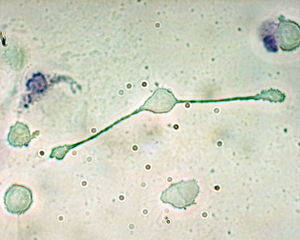A Virus Linking Depression, Aging and Heart Disease

We have known for a long time that there are close links between depression, aging and heart disease, but the nature of the link has remained elusive. Most of the smart money has been on inflammation, but there could be other candidates.
New research in the journal Brain, Behavior and Immunity has linked an increase in two inflammatory proteins in the immune system with a latent viral infection and proposes a chain of events that might accelerate cardiovascular disease. It is possible that the same process may be involved in a number of other ailments that can afflict us, as we get older. The findings also suggest that chronic depression may play a key role in initiating the cascade that can lead to the development of coronary artery disease.
It has been known for some time that increased levels of the proinflammatory cytokines, TNF-α and IL-6, predict mortality and morbidity. High levels of each of them are found in the plasma and in atherosclerotic lesions of people with cardiovascular disease.
The levels of IL-6 in the body increase as the immune system ages. Some of the IL-6 is generated by immune cells – macrophages – that go to the site of an infection or injury. Earlier work by the team also showed that increases in psychological stress and depression could substantially raise the levels of IL-6 and TNF-α in the body.

Increased stress and depression can also trigger latent viruses to reactivate and begin reproducing inside cells. The viruses of greatest interest are some herpes viruses such as the Epstein-Barr virus (EBV). We know that up to 90% of the people in North America have been infected by EBV by the time they are adults.
If EBV begins to multiply in cells in the body, it produces a protein called dUTpase that, in turn, can stimulate macrophages to make yet more IL-6.
The researchers developed a model to test these linkages by using endothelial cells that line the inside of veins in umbilical cord tissue. I spent years working with these cells myself, and they provide an excellent substrate for examining vascular responses and the interaction between blood vessels and macrophages when exposed to the virus as well as the dUTpase protein.
As expected, the production of IL-6, as well as TNF-a, were increased just as they would be as part of the inflammatory process in the body. Such chronic incidents of inflammation are integral to the onset of atherosclerosis and an array of other diseases.
This work suggests a new way of thinking about how vascular diseases develop. We carry around these latent herpes viruses in our bodies virtually all our lives and periodically they can hurt us as we age, develop depression or, perhaps a nutritional imbalance.
Taken together with the recent data on the physical effects of loneliness, if you want to live a long and healthy life:
- Watch you mood: depression can kill you
- Stay socially engaged: loneliness can be fatal
- Maintain a balanced diet
- Take some physical exercise every day
- Learn – and practice! – some simple stress management techniques. You can obtain some at RichardGPettyMD.com






